Archive
Our partners at Guatemala Human Rights Commission, GHRC, are asking individuals and human rights organizations to support a Dear Colleague letter initiated by Representative Raul Grijalva as another step Congress can take to support human rights defenders and the rule of law in Guatemala. We are asking that you call or email your representative in the House. GHRC has an action page where you can e-mail your representative and get the phone number to their office. Click here to see who your representative is.
The letter highlights the following:
• The current Guatemalan amnesty law that would prevent justice for crimes against humanity carried out during the internal armed conflict,
• The impacts of Decree 4-2020, which allows the executive branch of the State discretionary powers to dissolve NGOs if their activities might “alter the public order,” and to prosecute their directors,
• The threats that democratic institutions, such as The Human Rights Ombudsman’s Office, are undergoing,
• Cases of persecution against human rights defenders, such as the Bernardo Caal Xol case; and
• The corruption case of Juan Francisco Sandoval, former head of the Special Prosecutor’s Office Against Impunity (FECI) and leading anti-corruption prosecutor.
Please help us work for the defense of human rights defenders, judges, and others who are under increasing attacks.
CRLN and some of Rep. Quigley’s constituents from Third Unitarian Church will send the following letter to him. If you are a constituent in Illinois’ 5th Congressional District, please click here to authorize us to sign your name, too.
September 21, 2021
Rep. Mike Quigley, Congressman, IL-5
Dear Rep. Quigley,
We are meeting today with your Legislative Assistant, Marshele Bryant. The purpose of our meeting is twofold:
1) To request that you co-sponsor two House resolutions on Honduras: the Berta Caceres Human Rights in Honduras Act (H.R. 1574) and the Honduras Human Rights and Anti-Corruption Act (H.R. 2716)
2) To request that you support a pathway to permanent protections for DACA recipients, TPS holders, farmworkers, and other essential workers.
H.R. 1574 would prohibit U.S. assistance to the police and military of Honduras and direct U.S. Representatives of multilateral development banks to vote against providing loans to the Honduran police or military. We thank you for co-sponsoring this legislation in the previous three sessions of Congress and ask that you do so again.
H.R. 2716 would also suspend U.S. assistance to the Honduran police and military until corruption, impunity, and human rights violations are no longer systemic and the perpetrators of these crimes are being brought to justice. In addition, it will impose sanctions on the Honduran president for corruption and human rights abuses and suspend U.S. security assistance and export licenses for covered defense articles and munitions items to the Honduran police and military, among other provisions.
Our organization is in touch with many human rights groups in Honduras, and what they tell us is alarming. Honduras has become a narco-state, as high level Honduran officials use the police and military to protect drug traffickers and their routes in exchange for bribe money. Some Honduran government and security officials are themselves trafficking drugs. Officials also use the police and military to stay in power, directing them to violently put down peaceful protests over election fraud, government corruption, and theft from public funds. Military and police have carried out targeted assassinations against human rights defenders and those who stand up against corruption—there is evidence of death squads within their ranks.
All of this is more than a case of a few bad apples: democracy, the rule of law, public safety, and life itself are being undermined, as evidenced by the large numbers of people leaving Honduras as migrants. The U.S. is currently pretending that by funding the military and police, we are increasing security. We are not. Please do your part to shut down this funding until corruption and impunity for human rights violations cease.
We also wanted to reach out and ask you for your consistent support of immigrants and for your continued support of legislation to provide a pathway to permanent protections for DACA recipients, TPS holders, farmworkers, and other essential workers.
We know that a pathway to permanent protections is vital to the long term success of our economy, communities and families and an important component to building back better. The public strongly supports a pathway to permanent protections and believes that Congressional action is long overdue. We are confident that enacting these reforms via reconciliation is the best way to finally get it done this year.
On behalf of the millions of immigrant workers and families, many who have been locked out of the ability to earn a pathway to permanent protections, including DACA recipients and TPS holders who have been essential to our communities’ response and recovery from COVID-19, we urge you to seize this historic opportunity.
Sincerely,
Since 2009, thousands of Honduran human rights defenders, Indigenous land and water defenders, journalists, union members, campesinos, people who identify as LGBTQ, and people protesting government policies and government corruption have been killed, attacked, criminalized, harassed, and “disappeared” by members of the Honduran military or police forces, or by death squads operating within these forces. The U.S. continues to send funding to both the Honduran military and police forces anyway.
Finally, 12 years after the military coup d’etat in Honduras, there are companion bills in both the House and the Senate that would suspend U.S. military aid and police aid to Honduras, including for training, equipment, weapons and munitions for crowd control (teargas, water cannons, etc.), and place personal sanctions on Honduran President Juan Orlando Hernandez and other high level officials in his administration or in the Honduran Congress for their corruption and anti-democratic actions. Representative Jan Schakowsky (D-IL-09) introduced the House version, and Senator Jeff Merkley (D-OR) introduced the Senate bill.
This gives us a pathway to pass binding legislation. We need your help to convince enough Representatives and Senators to co-sponsor these bills! With enough co-sponsors, the bills can pass out of committee and go to the floor of the House and Senate for a vote. You can find a list of co-sponsors and the text of the bills at the links in the previous paragraph.
Call the Capitol Switchboard at (202) 224-3121 and ask to be connected to your Senator (repeat for your second Senator and for your Representative). When you are connected to their office, ask to speak to the foreign policy aide. Be sure to get their name and email address so you can follow up with an email. If the foreign policy aide is not available, ask to leave a message on their voice mail. After you leave the message, send an email to the aide with your message.
Sample script: “My name is _____. I am a constituent of yours. I am calling (or writing) to ask (Senator or Representative _____) to co-sponsor The Honduras Human Rights and Anti-Corruption Act of 2021. The bill number is (S. 388 – Senate; H.R. 2716 – House). The bill calls for the suspension of ‘United States support for the Government of Honduras until endemic corruption, impunity, and human rights violations cease, and their perpetrators are brought to justice.’ Has (Senator or Representative _______) seen this bill? Can I count on them to join as a cosponsor? Please call me this week at (your phone number) to let me know if you have seen the bill, and if your boss will support it. For more information or to co-sponsor the bill, please contact (Caroline Kuritzkes and Matt Squeri in Senator Merkley’s office; or Kate Durkin in Representative Schakowsky’s office).”
Please contact Sharon at shunter-smith@crln.org when you send your message and call, especially if you get a response.
For fuller context of present-day Honduras, see the recent article in Harper’s Magazine by Andrew Cockburn, “Narco in Chief: How America Enables Corruption in Honduras.”
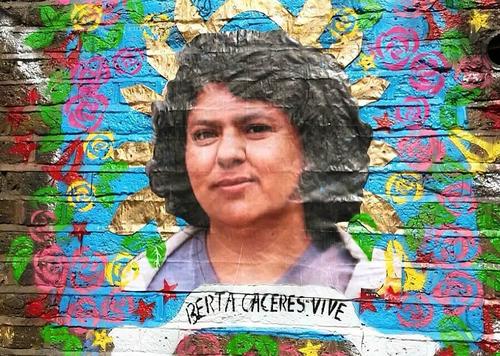
CRLN participated in a meeting called by COPINH, the organization founded by the slain Indigenous environmental activist and feminist Berta Caceres. They are calling for urgent international support, as evidence linking powerful members of Honduran society to Berta’s murder has emerged in the trial of David Castillo, one of the people accused of planning the assassination. The family has always contended that there were other intellectual authors of the murder. In retaliation, there has been a media campaign linking Berta Caceres and COPINH with criminal activities and putting pressure on the court to return a “not guilty” verdict against Castillo and to keep the others from ever having a case brought to court.
Please read the urgent action alert from the Honduras Solidarity Network and send the letter, which is the written text after the graphic, by scrolling to the bottom and entering your information. Spanish text follows the English text. You can find the action alert by clicking here.
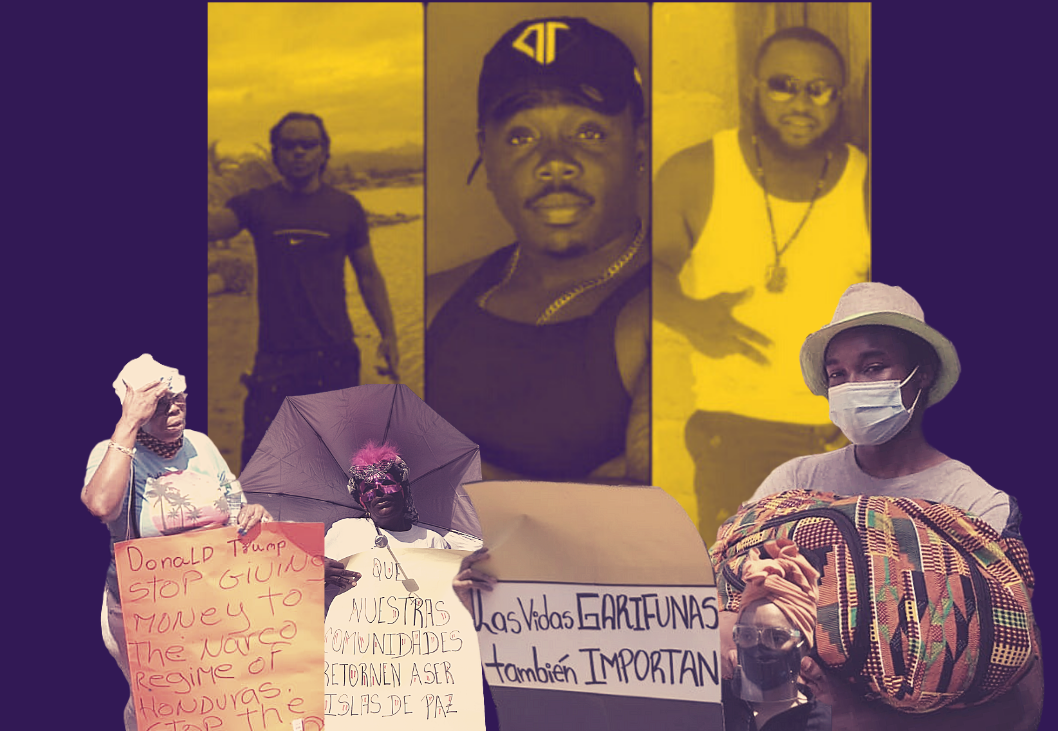
On July 18, 2020, 4 Garifuna men from Triunfo de la Cruz and a guest of the community were forcibly disappeared by men wearing Honduran Investigative Police Directorate vests. Their families have sought justice from the state but are unsatisfied with the lack of progress in the investigation and the contempt shown for their rights by the investigators.
Yesterday, the Black Fraternal Organization of Honduras (OFRANEH) sponsored a webinar calling for a new action from the international community: demand that the Honduran state incorporate the Committee for the Search and Investigation of the Disappeared of Triunfo de la Cruz (SUNLA) and any external experts it calls into the investigative process. SUNLA was formed at the request of the affected families and approved by the Assembly of the Garifuna people. Click here to read the letter to Honduran officials and sign on.
Aua Balde, member of the UN Working Group on Enforced or Involuntary Disappearances, explained that international law gives families of those forcibly disappeared the right to information from the state from its investigation of the crime. The Honduran state has failed to share information with the Garifuna families. International law also gives families the right to appoint other investigators if they are not satisfied with the state’s investigation and obligates the state to work with and assist these alternative investigators.
OFRANEH believes the men were disappeared because of their successful appeal to the Inter-American Court of Human Rights (IACHR) to rule on the state seizure of their land and forcible displacement of the Garifuna owners of that land in order to grant concessions to resort companies to build seaside hotels. The Court found in favor of the Garifuna in a ruling that directed the state to issue reparations and refrain from further forcible displacements and land seizures.
CRLN issued an action alert last July to its email list and signed onto a letter along with 221 other organizations demanding information of the whereabouts of the disappeared men, that the Honduran state comply with requests from the IACHR regarding information about the state investigation into their disappearance, compliance with the previous IACHR rulings about reparations, and protection for the family members and Garifuna communities at risk.
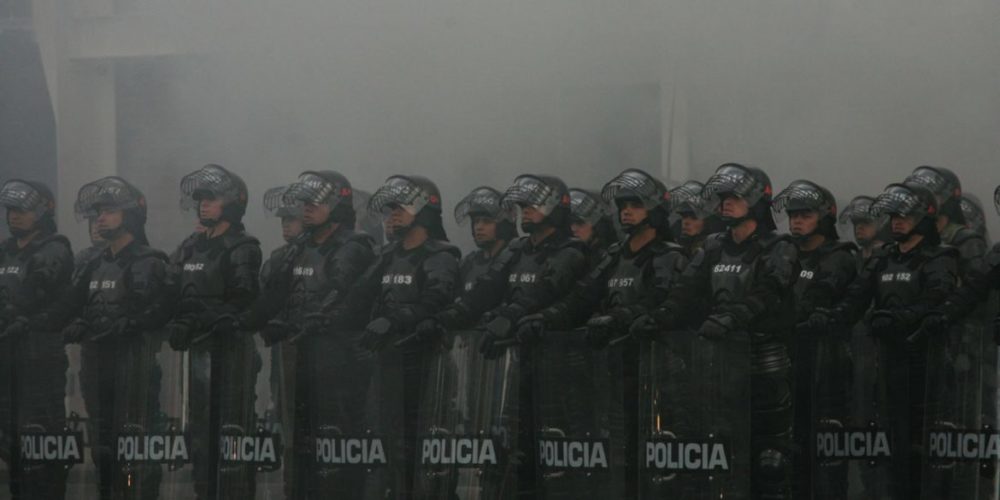
CRLN is alarmed by the brutal attacks since April 28 by the PNC (Colombian National Police) and ESMAD (Mobile Anti-Disturbance Squad) against protesters in multiple Colombian cities. These most recent national protests follow previous ones in November 2019 and September 2020, this time set off by the proposal by President Duque for a tax increase that would have placed a particular burden on those already suffering from loss of income from the COVID-19 pandemic. In addition, people were continuing to demand government implementation of the Peace Accords and an end to systematic assassinations of social leaders.
Between April 28 and May 3, the public security forces have killed 21 people, wounded 208, committed 42 aggressions and abuses against human rights defenders and journalists, engaged in 10 cases of sexual assaults against women, and arbitrarily detained 503, according to the Defend the Life Campaign (Campana para defender la vida). Last night in Cali, there were reports of police opening fire against protesters again and more lives lost and injured.
The United States, which provides funding to Colombian security forces, must speak out against the actions of the Colombian National Police and ESMAD, the Anti-Riot Squad, that used such egregiously excessive force against people. Rep. Jim McGovern (D-MA) has tweeted: “Peaceful protest & freedom of expression must be respected everywhere. U.S. aid to the PNC needs strong human rights protections and conditions. We should apply Leahy Law. No U.S. aid to Colombian ESMAD riot units that engage in gross human rights violations.” Email or call your members of Congress and ask them to call for an end to U.S. aid to any Colombian security forces that have engaged in these actions and send a strong message to Colombia that they must hold their security forces accountable for the harm they have caused..
For more information, see links below:
CRLN is a member of the Honduras Solidarity Network, a network of 30 North American groups formed after the 2009 coup d’etat in Honduras in solidarity with a broad array of social movements and citizens opposed to the subsequent regime and seeking greater social justice and democracy.
We ask you to support the international campaign against the criminalization of 8 Honduran citizens, now in jail for peacefully protesting the concession illegally given to a mining company to extract iron ore from the Carlos Escaleras National Park–the primary source of water for many of the surrounding communities. Please click on the link below
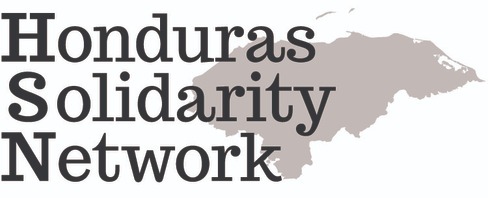 |
| Freedom for the Guapinol Water Protectors! On February 9, 2021 the United Nations Working Group on Arbitrary Detentions stated that the arbitrary detention of the Guapinol Water Protectors is related to their work in defense of the environment. Click here to Join the International Campaign to Demand Freedom for the Eight Guapinol Political Prisoners! After clicking on the link above, you will find more information in English and Spanish. Scroll to the bottom to fill in your name and email address in order to send letters to Honduran and U.S. officials to call for the release of the Guapinol 8. |
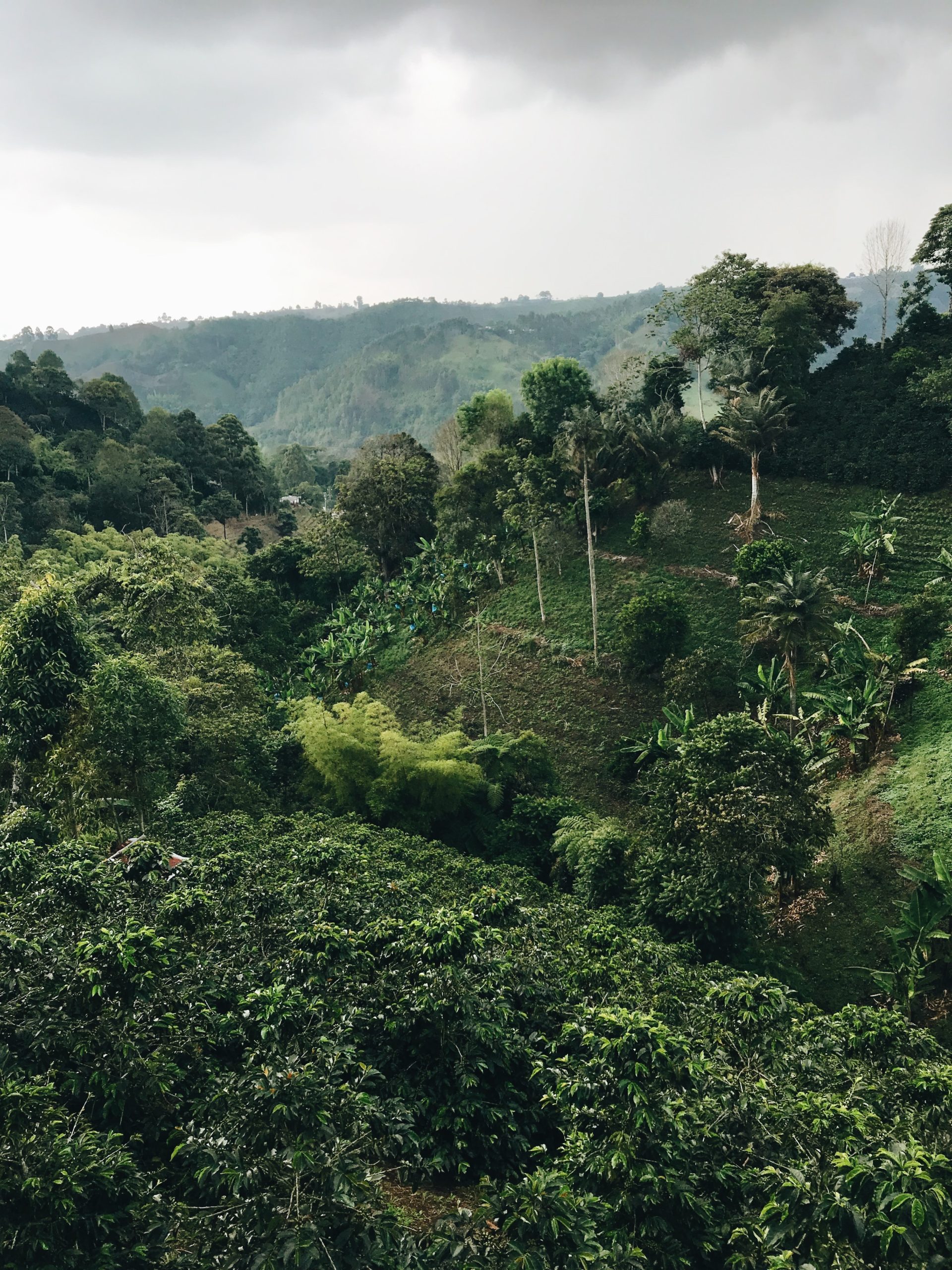
Colombia’s government is moving closer to reinstating a program, suspended in 2015, that would spray herbicides from aircraft over territories where coca is cultivated. Twenty-five U.S. and Colombian organizations have joined on this letter to President Joe Biden urging him to avoid supporting a renewed “fumigation” program, succinctly laying out the reasons why this would be an unfortunate policy mistake. The letter was shared with the White House on March 26.
March 26, 2021
President Joseph R. Biden, Jr.
The White House
Washington, DC
Dear President Biden,
We write out of strong concern about the imminent restart of a program that your administration is inheriting from its predecessor: an effort to eradicate coca in Colombia by spraying herbicides from aircraft. We encourage you not to provide funding for this program, which not only failed to achieve past objectives, but sends a message of cruelty and callousness with which the United States should no longer be associated. It will undermine the peace accords that are a powerful legacy of the Obama-Biden administration.
Aerial fumigation can bring short-term reductions in the number of acres planted with coca. But past experience shows not only that these gains reverse quickly, but that the strategy undermines other U.S. and Colombian security objectives. Recurring to fumigation is like going back in time, ignoring much that we have learned about what does and does not work.
Many of our organizations have published studies documenting the harm that fumigation has done in the past. The December 2020 report of the U.S. government’s bipartisan Western Hemisphere Drug Policy Commission found that forced eradication brought “enormous costs and dismal results.” Just since the end of February, we have seen strong critiques of forced eradication and fumigation from the International Crisis Group; the Ideas for Peace Foundation, a Colombian business sector think tank; a list of over 200 scholars, and seven UN human rights rapporteurs.
Between 1994 and 2015, a U.S.-backed program supported a fleet of aircraft, and teams of contract pilots and maintenance personnel, that sprayed the herbicide glyphosate over 4.42 million acres of Colombian territory—a land area 3 1/2 times the size of Delaware. In 2015 the Colombian government suspended the spray program, citing public health concerns based on a World Health Organization study finding glyphosate to be “probably carcinogenic to humans.”
For a few years afterward, the Colombian government failed to replace the strategy with anything—neither eradication nor assistance to affected areas. During the late 2010s, Colombia’s coca crop increased to record levels. Nearly all of the increase happened in the exact municipalities and communities where fumigation had been heaviest. After 20 years of constant eradication, farmers continue to face the same on-the-ground reality.
Most Colombian producers of the coca bush are not organized crime-tied criminals or supporters of illegal armed groups. They are families with small plots of land. Estimates of the number of families who make a living off of coca vary from “more than 119,500” to 215,000. If one assumes four people per family, then more than 2 percent of Colombia’s 50 million people depend on coca. Households earn about $1,000 per person per year from the crop, making them by far the lowest-paid link in the cocaine supply chain.
They live in “agricultural frontier” zones where evidence of Colombia’s government is scarce. Paved or maintained roads are nonexistent. The national electric grid is far off. There is no such thing as potable water or land titles. In some areas, even currency is hard to obtain, and stores offer the option of paying for groceries with coca paste.
These people need to be governed and protected by their state. An aircraft flying anonymously overhead, spraying chemicals on populated areas, is the exact opposite of that. But the program has other important disadvantages:
- Because it targets poor households in ungoverned areas, chemical fumigation sends a message of cruelty, and associates that message with the United States. Your administration is steadily working to undo the Trump administration’s cruel migratory measures, which imposed suffering on a weak, impoverished population at the U.S.-Mexico border. We ask that you also avoid returning to “deterrence though cruelty” in rural Colombia.
- Like any eradication without assistance, fumigation further weakens governance and threatens to worsen security in Colombia’s ungoverned territories, where illegal economies and armed groups thrive. Forced eradication, especially when uncoordinated with efforts to physically bring government services into territory, sends families from poverty to extreme poverty, with no official help in sight. This hurts the government’s legitimacy in frontier areas where it badly needs to be built up.
- After perhaps a short-term drop in cultivation, fumigation is not effective at reducing the coca crop. Past experience shows a high probability of replanting and other means of minimizing lost harvests, in contexts of absent government and few alternative crops.
- Fumigation goes against what Colombia’s 2016 peace accord promised. That document’s first and fourth chapters offered a blueprint for reducing illicit crops: first by engaging families in substitution programs, and then by carrying out a 15-year “comprehensive rural reform” effort to bring state presence to rural areas. Fumigation was meant to be a last resort, for circumstances when families were refusing opportunities to substitute crops and when manual eradication was viewed as too dangerous. Rushing to fumigate is a slap in the face to brave farmer association leaders who took the risky step of defying traffickers and leading their communities into the fourth chapter’s crop substitution programs.
- Similarly, fumigation risks large-scale social discord in rural Colombia. In 1996, after the program first got started, much of rural Colombia ground to a halt for weeks or months as mostly peaceful coca-grower protests broke out around the country. Today, farmers are even better organized than they were 25 years ago.
- Fumigation, meanwhile, may carry risks for human health and the environment. The 2015 WHO document is one of many studies that give us reasonable doubts about the health impacts of spraying high concentrations of glyphosate over populated areas from aircraft. Bayer, the company that purchased glyphosate producer Monsanto, has agreed to settlements with U.S. plaintiffs potentially totaling over $11 billion—another reason for reasonable doubt. While the environmental impacts are less clear, glyphosate’s own labeling warns against spraying near standing water sources, and we are concerned about its use in proximity to rainforest ecosystems. The largest environmental impact, though, is likely to be the way many past farmers have responded after losing crops to fumigation, while remaining in a vacuum of government presence: they move somewhere else and cut down more rainforest to grow coca again.
- Like all forced eradication unaccompanied by assistance, fumigation is dangerous for the eradicators themselves. In 2013, not long before the program’s suspension, FARC guerrillas shot down two spray planes within the space of two weeks. While planes and their escort helicopters will be more armored than before, the vulnerability remains. Eradication is far safer when it is agreed with communities by a government that is physically present in its own territory.
In March 2020, Donald Trump met with Colombian President Iván Duque and told him, “You’re going to have to spray.” The country’s highest court has required Duque’s government to meet a series of health, environment, consultation, and other requirements. Colombia’s Defense Minister is now predicting that the spraying could restart in April.
This time, U.S. Ambassador Philip Goldberg has stated, the U.S. role in the program won’t be as extensive. Still, during the Trump administration, the State Department supported maintenance of the spray plane fleet, upgrades to bases, and training of eradication personnel, among other services. State Department reports sent to Congress in late February and early March hailed fumigation’s imminent restart as a sign of progress.
Nonetheless, we reiterate our hope that the Biden administration will turn away from supporting Colombia’s spray program while there is still time. The United States should not support aerial fumigation in Colombia again. Nor does it have to. We know what to do.
Farmers with land titles hardly ever grow coca. Farmers who live near paved roads hardly ever grow coca. Criminal groups are badly weakened by proximity of a functioning government that is able to resolve disputes and punish lawbreaking.
This is a longer-term project, but Colombia’s 2016 peace accord offered a good blueprint for setting it in motion: a fast-moving, consultative crop substitution program, tied to a slower-moving but comprehensive rural reform program. Though those programs exist and parts of the Duque government are carrying them out diligently, they are underfunded and well behind where they should be as accord implementation enters its fifth year.
It’s not too late to help Colombia jumpstart the model offered by Colombia’s peace accord, which the Obama-Biden administration so effectively supported. We urge you to take that path instead of that of renewed fumigation, which we know to be a dead end.
Sincerely,
- Amazon Watch
- Center for International Environmental Law
- Centro Estudios sobre Seguridad y Drogas, Universidad de los Andes (Colombia)
- Chicago Religious Leadership Network on Latin America
- Colombia Human Rights Committee
- Consultoría para los Derechos Humanos y el Desplazamiento (Colombia)
- Corporación Viso Mutop (Colombia)
- Drug Policy Alliance
- Elementa DD.HH. (Colombia/Mexico)
- Fellowship of Reconciliation: Peace Presence
- Healing Bridges
- ILEX Acción Juridica (Colombia)
- Institute for Policy Studies, Drug Policy Project
- Institute on Race, Equality, and Human Rights
- Latin America Working Group
- Mennonite Central Committee U.S. Washington Office
- Missionary Oblates
- Oxfam America
- Oxfam Colombia
- Presbyterian Church (USA), Office of Public Witness
- Presbyterian Peace Fellowship
- Proceso de Comunidades Negras (Colombia)
- United Church of Christ, Justice and Witness Ministries
- Washington Office on Latin America
- Witness for Peace Solidarity Collective
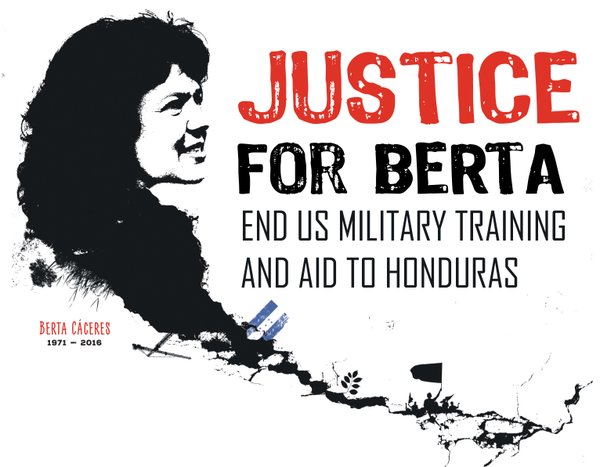
Rep. Hank Johnson (D-GA) has reintroduced the Berta Caceres Human Rights in Honduras Act (H.R. 1574) into the 2021-2022 session of the House of Representatives. This is the fourth session of Congress in which it has been assigned to a committee. We need your voice to make sure it passes out of committee this time so that the House has the chance to vote on it. A sample script for an email and phone call to your Representative, asking them to co-sponsor H.R.1574, follows the description of the bill below.
The bill calls for the suspension of all U.S. aid to Honduran security forces and for the U.S. to vote no on all loans from multinational development banks to Honduras, until the following conditions are met:
– Pursued all legal avenues to bring to trial and obtain a verdict of all those who ordered and carried out (1) the murder of Berta Cáceres, (2) the killings of over 100 small-farmer activists in the Aguán Valley, (3) the killings of 22 people and forced disappearance of 1 person by state security forces in the context of the 2017 postelectoral crisis, (4) the May 3, 2016 armed attack on Félix Molina, and the November 26, 2018 shooting of Geovany Sierra, (5) the July 18, 2020, forced disappearances of 4 Garifuna community leaders from Triunfo de la Cruz who were taken from their homes by heavily armed men wearing bulletproof vests and police uniforms; and (6) the December 26, 2020, killing of indigenous Lenca leader Felix Vasques in La Paz, and the December 28, 2020, killing of indigenous Tolupan leader Adan Mejia in Yoro;
-Investigated and successfully prosecuted members of military and police forces who are credibly found to have violated human rights, and ensured that the military and police cooperated in such cases, and that such violations have ceased;
-Withdrawn the military from domestic policing, in accordance with the Honduran Constitution, and ensured that all domestic police functions are separated from the command and control of the Armed Forces of Honduras and are instead directly responsible to civilian authority;
-Established the effective protection of the rights of trade unionists, journalists, human rights defenders, the Indigenous, the Afro-Indigenous, small-farmers, and LGBTI activists, critics of the government, and other civil society activists to operate without interference; and
-Taken effective steps to fully establish the rule of law and to guarantee a judicial system that is capable of investigating, prosecuting, and bringing to justice members of the police and military who have committed human rights abuses.
Instructions for your call and email: Call the Capitol Switchboard at (202) 224-3121 and ask to be connected to your Representative. When you are connected to their office, ask to speak to the foreign policy staffer. Be sure to get the name and email address of the foreign policy staffer so you can follow up with your message in writing. If the foreign policy aide is not available, ask to leave a message on their voice mail. After you leave the message, send an email to the aide with your message.
Sample script: “My name is _____. I am a constituent from Rep. ___________’s district. I am calling (or writing) to ask Representative _____ to co-sponsor the Berta Caceres Human Rights in Honduras Act, H.R. 1574. The bill calls for the suspension of security aid to Honduras until human rights violations by Honduran security forces cease and the perpetrators have been brought to justice. Have you seen the bill? Would you bring it to the attention of Representative _______ ? Can I count on Representative _____________to join as a cosponsor? Please call me this week at (your phone number) to let me know if you have seen the bill, and if Representative _____ will support it. For more information or to co-sponsor the bill, please contact Chelsea Grey (chelsea.grey@mail.house.gov) in Rep. Johnson’s (GA) office.”
Note: Please do not contact Chelsea Grey yourself. Ask your Representative’s staff person to do this.
Please contact Sharon at shunter-smith@crln.org when you send your message and call, especially if you get a response.
